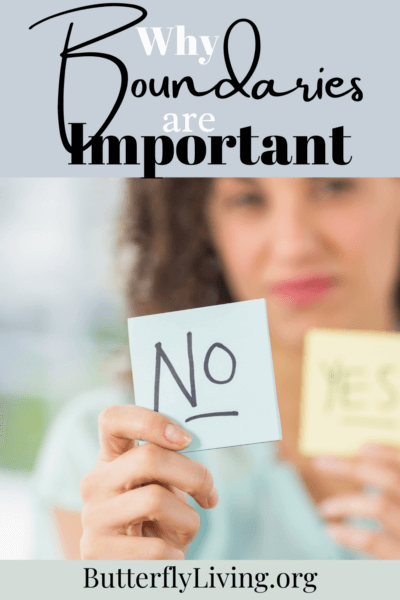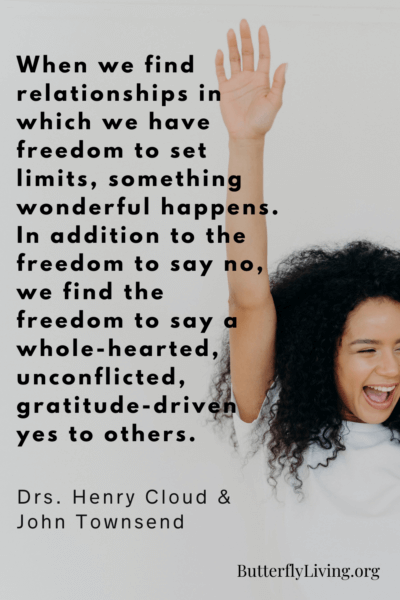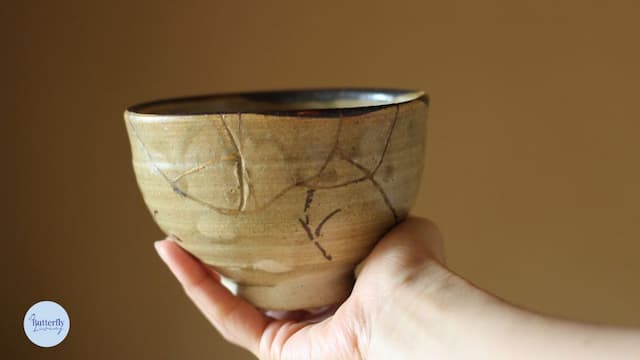What are Healthy Boundaries and 8 Ways to Develop Them
When we learn how to develop healthy boundaries for ourselves, it is an investment that will impact every area of our life. Boundaries allow us to function freely within the guides we set for ourselves.
Understanding how to develop healthy boundaries in relationships can be more difficult especially with people we love. The boundary lines in our closest relationships often get blurred and when someone crosses a boundary, it is uncomfortable to speak up.
Recently I was reminded of healthy boundaries as I walked my dogs. My neighbor had painted two bold, white stripes on each side of his driveway. It was an unusual look for a driveway, so I paused to examine the stripes and speculate on why the boundaries were added.
My neighbor said he needed clear, bold boundary lines. The boundary lines guided him so he could stay in his driveway and not cross over into his neighbors.
The visual of the bold white stripes provide a glimpse into what developing healthy boundaries looks like. Boundaries guide us so we know what is our responsibility and how to stay in our own lane physically and emotionally.
What Does it Mean to Have Boundaries?
A great resource to study what does it mean to have boundaries is the book series by Dr. John Townsend and Dr. Henry Cloud. Their books address personal boundaries and those of important relationships in our life. The Boundaries book series is recommended to understand the full scope of healthy boundaries.
“Any confusion of responsibility and ownership in our lives is a problem of boundaries. We need to set mental, physical, emotional, and spiritual boundaries for our lives to help us distinguish what is our responsibility and what is not.”
Boundaries Book
A boundary is a line that marks the limits of an area, but unlike painted lines on a driveway, in life understanding and communicating boundaries can be difficult.
In healthy relationships, boundaries define the line where my business ends and someone else’s starts, and are instrumental to healthy growth in relationships. The expression, “mind your own business” could be changed to ‘mind your own boundaries’ which takes discipline to do!
What does it mean to have boundaries? Psychologist Joaquin Selva answers by stating,
“Setting boundaries is an important part of establishing one’s identity and is a crucial aspect of mental health and well-being. Boundaries can be physical or emotional, and they can range from being loose to rigid, with healthy boundaries often falling somewhere in between.”
Since boundaries are a crucial part of healthy relationships, why is it so difficult for us to mind our own business?
It starts with being confident in our identity in Christ and our purpose. If our identity and God-given purpose are the lenses we use for our lives, we can paint our own white lines or boundaries so we can focus on what God is calling us to do.
How Do I Find My Boundaries?
Whenever I pass those bold stripes it reminds me of the saying, “stay in your lane”. The term originated in sports and has been used by coaches to instruct players to stick to their assignment or in other words, “in order to succeed in the game don’t worry about everyone else’s job.”
Finding my boundaries is similar to staying in my lane or white stripes on a driveway; they are guidelines and limits for us to use to live in healthy relationships. When we live within our boundaries we focus on our own assignment. We embrace our purpose instead of trying to control someone else’s.
“The most basic boundary-setting word is no. It lets others know that you exist apart from them and that you are in control of yourself.”
Boundaries Book
“And don’t say anything you don’t mean. This counsel is embedded deep in our traditions. You only make things worse when you lay down a smoke screen of pious talk, saying, ‘I’ll pray for you,’ and never doing it, or saying, ‘God be with you,’ and not meaning it.
You don’t make your words true by embellishing them with religious lace. In making your speech sound more religious, it becomes less true. Just say ‘yes’ and ‘no.’ When you manipulate words to get your own way, you go wrong.”
Matthew 5:33-37 MSG
Understanding our no, also clarifies our yes.
“Find that courageous yes. Fight for that confident no.”
Lysa TerKeurst,
The Best Yes: Making Wise Decisions in the Midst of Endless Demands
We are a culture that acquires expertise in any field through the internet and social media. Because we are so informed, we toss opinions around with the assumption that our way is the best. Whether we are in line at the grocery store, at a ball game, or advising a friend it is hard to resist the temptation to give an opinion.
The problem with opinion slinging is we don’t know what someone else is feeling or going through and usually don’t know the whole story. (besides the plethora of incorrect information out there!)
How do I find my own boundaries?
By focusing on the message God has for you instead of delivering messages to others. When we jump in others’ lane, we sometimes miss the message God is trying to deliver to us.
Why do I Lack Boundaries?
Why do we lack boundaries? Because we don’t understand who we are, what we want, and what we value. We are confused about our identity, purpose, or carry around a load of mistakes, disappointments, or resentment.
When we lack healthy boundaries, it affects our emotions, our spirituality, and our relationships.
If we jump lanes occasionally that is one thing, but repetitive boundary jumping undermines our spiritual growth and the building of healthy relationships.
“People with poor boundaries struggle with saying no to the control, pressure, demands, and sometimes the real needs of others. They feel that if they say no to someone, they will endanger their relationship with that person, so they passively comply and inwardly resent.”
Boundaries Book
A life lacking in boundaries does not lead to a life living in the freedom of Christ.
4 Situations that Demonstrate a Lack of Boundaries:
- When someone sees us making a decision that they disagree with, and give us unsolicited advice, they lack healthy boundaries.
- When someone thinks they have a better option for us and try to sell it, they lack healthy boundaries
- When someone imagines damage caused by our actions and tries to reroute us, they lack healthy boundaries.
- When we express a certain request and someone disregards it and does what they want, they lack healthy boundaries.
A lack of boundaries can affect small decisions or life-altering ones. From the person next to us parking incorrectly, to a neighbor’s yard decor, to our adult child’s dating choice.
In many situations, I am tempted to step around the white lines into someone else’s lane, but my job is to consider and respect the integrity of those around me. To spend time with the people God puts in my path. To listen, love, and grow together.
To be confident in my value and the value of others means respecting their right to say no and their privacy. The problem when I lack boundaries is it distracts me from what I am called to do; my purpose in life is not to judge everyone else’s decisions.
Boundary jumping seems much easier than uncovering and persevering with our own issues.
Why do I lack boundaries? Because we think we are right, are afraid to say no, lack clarity with our purpose, or are weary or broken from the disappointments and struggles of life.
“Like a city whose walls are broken through is a person who lacks self-control.”
Proverbs 25:28 NIV
When we lack boundaries, we become exhausted and discouraged and our spirit has no margin to love and serve others. But Jesus can redeem our situation and bring clarity, encouragement, hope, and purpose.
The Holy Spirit will prompt us when it is time to listen and when it is time to speak or act. When we pray to have healthy boundaries God will step in and guide us to a new freedom.
What Does it Mean to Have Boundaries in Relationships?
What does it mean to have boundaries in relationships? We respect that those around us are capable of making their own decisions without our opinion unless they ask for it.
This is extremely hard to do in close relationships especially with our spouses, family members, children, and close friendships. As our children grow, it is important to adjust our boundaries to reflect their maturity.
“If we love and respect people who tell us no, they will love and respect our no. Freedom begets freedom. If we are walking in the spirit, we give people the freedom to make their own choices. When we accept others’ freedom, we feel better about our own”
Boundaries Book
When we understand what it means to have boundaries in relationships we are saying, “I love and value you, so I release the need to be in control of your choices”.
Healthy boundaries in relationships also mean we are willing to stand by each other even if we disagree with a decision that is not in our best interest. Boundaries help us let it go and move on.
“Where the Spirit of the Lord is, there is freedom.”
2 Corinthians 3:17
“It is absolutely clear that God has called you to a free life. Just make sure that you don’t use this freedom as an excuse to do whatever you want to do and destroy your freedom. Rather, use your freedom to serve one another in love; that’s how freedom grows.
For everything we know about God’s Word is summed up in a single sentence: Love others as you love yourself. That’s an act of true freedom. If you bite and ravage each other, watch out—in no time at all you will be annihilating each other, and where will your precious freedom be then?”
Galatians 5:13-15 MSG
8 Tips to Learn How to Develop Healthy Boundaries:
Here are 8 tips to learn how to develop healthy boundaries that have helped me stay in my lane and respect the lane others choose for themselves.
1.Respect the choices other people make even if we disagree with them.
2.We can’t impose our definition of boundaries on others, but we can guard our own personal boundaries
3.Realize we don’t always know the right way.
4.At times we jump the white lines because we sense danger or we are asked to, but we don’t need to stay there long
5.Pray more than we speak into people’s lives
6.Hold our comments unless we are asked for an opinion and even then chose words carefully.
7.It may be necessary to communicate our boundaries and repeat them if someone fails to respect them.
8.Learning to say no is important when learning to protect our own boundaries. Remember, a kind no is better than a dishonest forced yes.
“He who guards his mouth and his tongue guards his soul from troubles.”
Proverbs 21:23 NKJ
“My choice is you, God, first and only. And now I find I’m your choice! You set me up with a house and yard. And then you made me your heir!”
Psalm 16:6 MSG
 What are Examples of Personal Boundaries?
What are Examples of Personal Boundaries?
We all have examples of personal boundaries in life. Understanding our personal boundaries and those of other people helps us notice boundary problems that may cause issues in our relationships.
Learning how to develop healthy boundaries begins when we understand what boundaries look like for ourselves and in our relationships.
5 Examples of Personal Boundaries:
- My husband likes to take a certain route when he is driving that I don’t take. If he is driving, I need to be quiet and respect his decision.
- My adult son wears his hair longer than I like. I think his hair looks better short. Not my lane. Even continual, innocent comments are boundary-crossing and irritating.
- My college-aged daughter keeps her car a mess. This is not my car or my business. As much as it bothers me, repeated comments become noise and actually can lead to the opposite outcome.
- My friend often comments on decisions or choices I have made. These comments are unsolicited and tend to be judgmental and hurtful. It is ok to let her know that I am hurt by her comments and will let her know when I need advice or help.
- A relative comes over a couple of times of the year and negatively comments on the decor in my home. Definitely an example of crossing a personal boundary but probably not worth addressing.
“When we fail to set boundaries and hold people accountable, we feel used and mistreated.”
Brene Brown
“When we find relationships in which we have the freedom to set limits, something wonderful happens. In addition to the freedom to say no, we find the freedom to say a whole-hearted, unconflicted, gratitude-driven yes to others. We become attracted to boundary lovers because, in them, we find permission to be honest, authentic, loving individuals.”
Boundaries Book
“The only way our faith will ever strengthen is for us to use it. We need to apply thought and prayer to our decisions and then trust God for the outcome. We need to set our sights on growing in faith, not shrinking back for fear of failure.”
Lysa TerKeurst
Books on How to Develop Healthy Boundaries
If you would like to study more about what are examples of personal boundaries and their importance in our lives and in our relationships, check out these 4 books on how to develop healthy boundaries by Dr. Townsend and Dr. Cloud:
“Many people focus so much on being loving and unselfish that they forget their own limits and limitations. That’s why the ability to set clear boundaries is essential to a healthy, balanced lifestyle.”
“Two lives becoming one sounds easier said than done. After the honeymoon is over, how do you solve problems? How do you establish healthy communication? How do you work out conflict and deal with the struggle of differing needs? Drs. Henry Cloud and John Townsend show how you and your mate can experience marriage at its best.”
“Get the help you need for raising your kids to take responsibility for their actions, attitudes, and emotions. Drs. Henry Cloud and John Townsend take you through the ins and outs of instilling the kind of character in your children that will help them lead balanced, productive, and fulfilling adult lives.”
“Dr. John Townsend provides the expert insight you need to help your teens take responsibility for their actions, attitudes, and emotions while gaining a deeper appreciation and respect both for you and for themselves.”
My hope is that you have learned more about how to develop healthy boundaries. I Would love to hear in the comments about how boundaries have helped you in your relationships.














